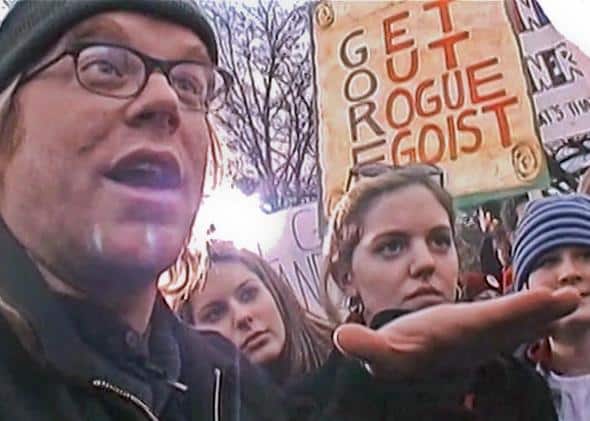Read also:
How to Watch FX Live Without CableHow To Watch AMC Without CableHow to Watch ABC Without CableHow to Watch Paramount Network Without CableBefore he passed away at the age of 46, Philip Seymour Hoffman starred in 52 feature films. Starring roles, character pieces, chameleon work—he left a legacy nearly unmatched in both quality and quantity. Now, with P.S.H. I Love You, Jonah Koslofsky wafts through the cornucopia of the man’s offerings.
The election. It’s happening; chances are it’s already seeped into your psyche, an added layer of anxiety in an already anxious time. No matter who wins – or potentially steals – the contest, it’s clear our system’s weighed down by a truckload of problems. This is hardly a hot take: twenty years ago, Philip Seymour Hoffman “hosted” The Party’s Over, a documentary set around the 2000 election. Hoffman and the filmmakers embarked on a cross-country expedition, in an attempt to answer one question: how much should one engage with the two-party system as it exists? Is the whole thing just a sham?
In the years since, this thing has faded into obscurity: all traces have been scrubbed from the Film Movement website, and I was only able to see it after I ordered the DVD from Amazon (apparently, there are only ten left in stock). As a result of its total lack of a reputation – its Wikipedia page doesn’t list the correct runtime – I assumed the worst. But it turns out, Philip Seymour Hoffman’s only foray into documentary has its merits, especially when the camera accidentally captures the actor’s rare appearance out of character.
It’s also apparently the sequel to The Last Party, a similar exercise in which a young Robert Downey Jr. visited both conventions in the run-up to the 1992 election. Replacing Downey with Hoffman makes sense: the latter has a much more earnest presence, coming off as a regular guy, not a sarcastic, larger-than-life movie star. Things swapped behind-the-camera too: Hoffman’s doc was directed by Donovan Leitch Jr. (credited as a writer on The Last Party) and Rebecca Chaiklin, who’s actually one of the two directors of Tiger King. Her first project actually suffers from similar issues, most notably a lack of focus, as The Party’s Over ricochets from topic to topic at breakneck speed.

I’m also skeptical of the entire premise: why do you need an actor to illustrate the gap between the political process and the issues people actually care about? And what were Leitch and Chaiklin trying to actually accomplish, outside of a scattershot sketch of the country? Filmed on handheld, digital video cameras, the pro-Nader crew talks to Noam Chomsky and Bill Maher, elected officials, activists and a whole bunch of “regular people.” “Razzle Dazzle” plays over footage of both the DNC and RNC. The Party’s Over has a lot less to say than it thinks, functioning as more of a time capsule than an indictment.
But this is Hoffman in a role he often avoided playing: himself. “I think part of being an actor is staying private,” he once told 60 Minutes, “part of doing my job is that they [the audience] believe I’m someone else […] you don’t want everyone to know everything about your personal life or they’re going to project that on the work you do.” The Party’s Over is an exception: we get to see Philip Seymour Hoffman, a progressive, cynical guy who cares about other people and the state of the world.
He hasn’t got a lot of faith in either party. As an interviewer, he lets his subject be the louder voice, an engaged listener instead of a domineering force. But there are times he can’t keep quiet, like when a gay conversion therapist (who’s seemingly endured similar abuse) tells him that the urge to help others comes inherently – and only – from Christianity. Hoffman stammers, genuinely taken aback by what evangelical’s said. “I don’t know, I just think it’s human nature, I would hope.”
Why do you need an actor to illustrate the gap between the political process and the issues people actually care about?
“You walk down the street, you see someone lying over a grate, you care, […] not because I was in a church and it was told to me.” For a change, no one’s given Hoffman these lines – they’re him, speaking frankly. Even as he’s professional and guarded, it’s bizarre watching the actor chat with John Kerry and Newt Gingrich. He’s a solid spokesperson throughout, but you can also see his interest really pique when conversations around substance abuse and “the war on drugs” arise.
Then again, it’s for the best Hoffman didn’t “host” any other documentaries: his voiceover is strikingly bad. He sounds stilted and unenthusiastic, clearly just reciting lines in a booth. Why Chaiklin and Leitch didn’t make him do another take is beyond me. On the other hand, when Hoffman speaks with a prison reform activist and asks if this country is “intrinsically racist,” The Party’s Over feels genuinely ahead of its time.
But then we cut to another moment, another glimpse at another nuanced issue not given its due. The filmmakers also fail to capitalize on history proving them right: their election was decided not by the voters, but the Supreme Court – for some reason, this doc cares more about the pageantry of the conventions. It’s a frustrating oversight. Plus, because it’s so focused on the election, The Party’s Over ignores the major significant event of the following September. Documentaries often feel outdated years later – this one was outdated on release.
Still, if you’re looking for a Philip Seymour Hoffman performance like no other, seek out The Party’s Over. As her recent Netflix sensation proved, there are merits to Chaiklin’s sensationalist style. At only 89 minutes, this is a brief and occasionally worthwhile trip back to 2000, and a fraught election that seems like small potatoes next to our own.